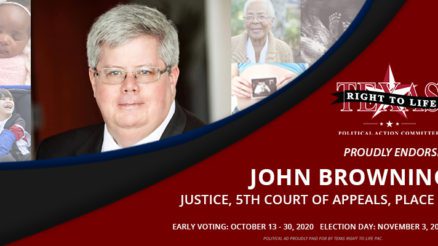Fifth Circuit Court of Appeals enforces crucial Life-saving provisions of HB 2
The United States Court of Appeals, Fifth Circuit, ruled yesterday on two pivotal provisions of House Bill 2, the Pro-Life Omnibus Bill that passed the Legislature in 2013; the provisions have been largely stalled for two years by anti-Life legal tactics. The requirement that abortionists secure hospital admitting privileges and the requirement that abortion mills meet the same standards as ambulatory surgical centers (ASCs) were the subject of the favorable ruling.
The three-justice panel of the Fifth Circuit Court issued a narrow ruling that permits the full implementation of HB 2 across Texas, exempting a clinic and one doctor based in McAllen. Whole Woman’s Health of McAllen will be the only operational Texas abortion mill that does not meet ASC standards. Furthermore, unlike all other abortionists, Sherwood Lynn of McAllen will not be required to obtain hospital admitting privileges within a 30-mile radius of the abortion mill.
In addition to McAllen, eight operational abortion mills will remain open in Texas after HB 2 goes into full effect in July: two in Houston, two in San Antonio, three in the Dallas–Fort Worth area, and one in Austin.
Having exhausted most of their legal recourse in the state, the abortion industry is expected to appeal the decision to the Supreme Court of the United States. The Texas abortion chain Whole Woman’s Health, a plaintiff in the lawsuit to nullify HB 2, stated in an email released Tuesday: “We are more determined than ever and will stop at nothing to preserve Texas women’s access to safe abortion care—and that includes taking this battle to the United States Supreme Court.” Likewise, New York-based legal group the Center for Reproductive Rights, which has been heavily involved in the case against HB 2 from the beginning, tweeted:
<blockquote class="twitter-tweet" lang="en"><p lang="en" dir="ltr">Appealing to the Supreme Court is "the best course of action" – <a href="https://twitter.com/ReproRights">@ReproRights</a> Senior Counsel Stephanie Toti on <a href="https://twitter.com/hashtag/HB2?src=hash">#HB2</a>. <a href="https://twitter.com/hashtag/FightBackTX?src=hash">#FightBackTX</a></p>— CenterforReproRights (@ReproRights) <a href="https://twitter.com/ReproRights/status/608352599528599553">June 9, 2015</a></blockquote>
<script async src="//platform.twitter.com/widgets.js" charset="utf-8"></script>
Although unpredictable, the Supreme Court could solidify Texas’ Pro-Life protections while concomitantly strengthening Pro-Life laws for every state by defining clearer standards of the notion of “undue burden” – the vague term upon which the abortion industry founded their legal opposition to HB 2. In January, Texas Right to Life explained:
The notion of undue burden is derived from Planned Parenthood v. Casey, a 1992 Supreme Court case, which is interpreted to convey that abortion cannot be restricted to the point at which significant obstacles to abortion access would exist. However, the language is incredibly vague, and has been sabotaged by abortion advocates in the legal system who toss “undue burden” around any time a Life-affirming law hurts Big Abortion.
In their legal attacks on HB 2, abortion advocates claim that the reduced number of abortion mills resulting from higher medical standards (with which abortion businesses cannot or will not comply) constitutes an undue burden because many Texas women will have to travel inconvenient distances to commit an elective abortion. This claim is deeply deceptive since abortion advocates here are pretending that women in El Paso will drive three hours east to San Antonio, instead of driving 20 minutes west to the abortion clinic in Santa Teresa, New Mexico, or driving 45 minutes northwest to a new abortion clinic in Las Cruces, New Mexico opened by the primary plaintiff challenging HB2 in this case.
Even overlooking the two open clinics within 45 minutes of El Paso, abortion advocates insist that long travel time threatens women’s health. However, abortion is a 100% elective procedure that is never necessary to preserve a woman’s Life. On the other hand, the same opponents decry the provisions of HB 2, the purpose of which is to protect women’s health. The ASC requirement ensures that abortion mills can accommodate emergency personnel when they are called to botched abortion scenes, while the admitting privileges requirement ensures that an abortionist can quickly have his patient admitted to the hospital where she is taken in such an event.
Interestingly, in January the same three-judge panel who ruled yesterday called the abortion lobby’s alleged concern for the undue burden of women into question, asking what was unduly burdensome about a long drive to and from a woman’s abortion. They stated that in a large state like Texas there are numerous citizens who travel for more basic health care procedures and services. One justice probed the abortion industry’s lawyer to clarify her concerns as to whether her client believed that a woman could experience a medical emergency related to the abortion on her way home from the abortion.
The questions drew the abortion lobby’s myopic focus into uncharted and uncomfortable territory. At this point in the trial, the abortion advocates conceded to the Fifth Circuit panel that abortion complications do occur (something they had been trying to deny during the past two lawsuits) – and such complications are foreseeable during the woman’s drive home. Nevertheless, this contradictory and weak “undue burden” attack on HB 2 is the same argument that Big Abortion plans to sell to the Supreme Court of the United States on appeal.
The Fifth Circuit ruling was a victory for Texas’ most pro-woman, Pro-Life law. Updates will be provided at TexasRightToLife.com and through social media with news and information on the status of HB 2 and other Pro-Life policies.
Tags: hb 2, judiciary, legislation




